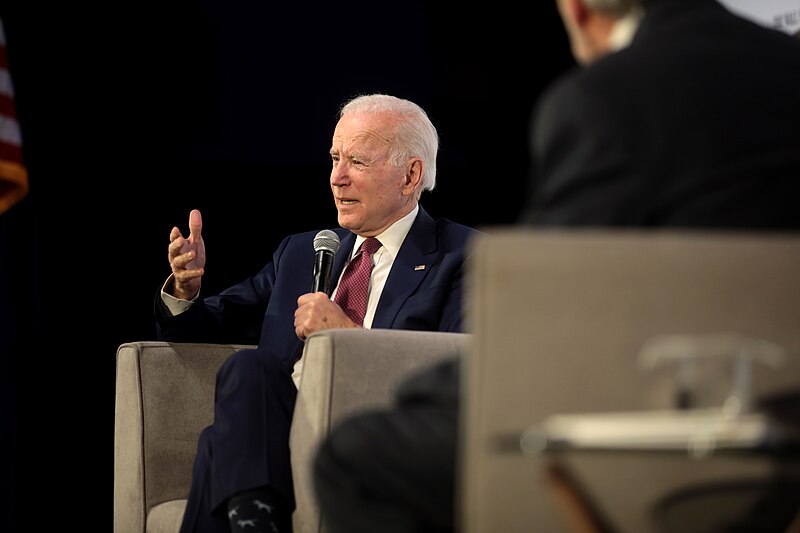- 14 3402-5578
- Rua Hygino Muzy Filho, 737, MARÍLIA - SP
- contato@latinoobservatory.org
 Gage Skidmore from Surprise, AZ, United States of America
Gage Skidmore from Surprise, AZ, United States of America
Since Joe Biden took over the presidency of the United States in 2021, his administration has suffered several criticisms related to the issue of immigration. He was also a protagonist in controversies related to the topic, mainly in relation to his unfulfilled electoral promises and his difficulties in dealing with the increase in immigration into the country. This analysis aims to demonstrate what the likely consequences of a second term for Joe Biden will be for Latinos/Hispanics if he is re-elected in November 2024, just as the previous analysis was carried out on the consequences of a second term for Donald Trump by Latino Observatory a few weeks ago. To begin the discussion about the future, we must first visualize what was done in the past and what are the consequences of that today.
According to a report by the Pew Research Center in January 2022, the Biden
administration acted on several fronts to reverse some of the anti-immigration
restrictions established during the Trump administration, among them: plans to
increase refugee admissions starting in fiscal year 2022, an attempt to
“protection and fortification” of the so-called “Dreamers” – immigrants brought
to the United States as children and who are part of the DACA (Deferred Action for Childhood Arrivals)
program – after a federal court in Texas attempted to end the program, as
analyzed by Latino Observatory stillin 2022; and also for not enforcing the
“public charge” rule that denies green
cards to immigrants who may need to use public benefits like Medicaid. In addition, Biden removed
some restrictions, including the Title 42
health restriction, established at the beginning of the Coronavirus
pandemic that drastically reduced the entry of immigrants and the obtaining of
visas, increasing the rapid deportation of illegal immigrants who tried to
cross the border, and which was used systematically by the Trump Administration.
The Pew Research report also cites that Biden's biggest immigration proposal at the time would allow new immigrants to settle in the country, while giving millions of undocumented immigrants already there a path to legalizing their status, starting from updates to the migration system based on family status, review of employment immigration rules and an increase in the number of diversity visas.
The Migration Policy Institute published a study in January 2024 which reports, however, that the US southern border saw a record of at least 6.3 million encounters with immigrants since Biden assumed the presidency, according to data from the Office of Homeland Security Statistics, resulting in more than 2.4 million illegal immigrants entering the country. The article states that most of these immigrants are in the process of active removal in immigration courts and reviews the biggest actions taken by the Biden administration in its first three years in office, focusing on border enforcement, interior enforcement and the impacts on North American cities, humanitarian protection, immigration courts, and legal admissions.
As he had promised during his campaign, on his first day in office, Joe Biden reversed many immigration policies used by Donald Trump, including the interruption of the construction of the wall on the border with Mexico, the so-called “Muslim ban”, a series of executive orders that restricted travelers from at least 14 countries (mainly of Muslim origin), and the executive order that reaffirmed protection for beneficiaries of the DACA program. In January 2023, Biden announced that he would strengthen the legal admission of immigrants originating from Cuba, Haiti, Nicaragua and Venezuela, while strengthening border security to prevent illegal entry, and in May of the same year, his administration approved the deployment of new troops to the border with Mexico after the end of Title 42. The construction of the wall was one of the biggest controversies in Joe Biden's government, given the fact that, in October 2023, he suffered widespread criticism from both parties after the announcement of the continuation in the construction of 32 new kilometers of the wall in Texas, even though he stated that he had no choice as the funds for this would have been allocated during the Trump administration.
It is important to highlight that Biden promised, in his 2020 campaign, a radical change in immigration policies. However, the large mass of asylum seekers at the US-Mexico border has significantly affected the country's immigration resources, becoming a political problem. According to the CNN publication, the Joe Biden's administration's handling of immigration had its lowest approval rating with just 30% of Americans approving of the way he was handling the border. When you add up all these situations, a drastic change is noticeable in the way Biden talks today about the situation at the border, moving away from his more liberal (or progressive) positions which he adopted as a candidate in 2020, a time when illegal crossings were significantly smaller than they are today.
The situation at the border has become a major political challenge in Joe Biden's quest for re-election. Now, even Democratic leaders are accusing his administration of not doing enough to address the issue. Added to this, questions arise as to whether the policies adopted by Biden are effective in the face of this growing number of illegal immigrants and the difficulty of some cities in dealing with the large influx of immigrants.
Presidential powers in the field of immigration are limited in enforcing existing laws, but he has authority over how to enforce these laws – this is what The Conversation text states. The possibility of improving these immigration laws also depends on a budget approved by Congress. Without this approval, the president cannot use the money to, for example, increase the capacity of immigration detention facilities or send more Border Patrol agents to process undocumented immigrants entering the country. It is important to note that in early 2024, Republicans in the Senate refused to approve a bill that would make it more difficult to obtain asylum in the country and that would give Biden more powers to refuse asylum requests when crossings reach the number of 5,000 daily.
The bill developed by a bipartisan team of lawmakers would also provide more federal funding to help immigration agencies and immigration courts more quickly review asylum claims and speed up the process, which remains with millions of pending cases. Biden stated that the project would hire 1,500 border security agents and officers, in addition to 4,300 asylum officers, speeding up the process that currently takes an average of six months to just six weeks. Faced with the immigration challenge, Biden is now considering using section 212 (f) of the Immigration and Nationality Act to gain more control over immigration, as with this law the president will be able to temporarily suspend or restrict immigration and the entry of all aliens whose arrival is considered harmful to the United States.
Even though the immigration crisis was one of the problems on which Biden was most active during his term, it appears to be one of his greatest vulnerabilities facing his bid for re-election in 2024, as there is a record number of illegal crossings and the administration of the southern border is the most criticized aspect of his administration in satisfaction surveys. Furthermore, the number of immigrants being deported or returned to their countries is now greater than it was under the Trump administration, increasing the strength of Republicans in the face of the problem to demonstrate the reasons why Donald Trump should be re-elected.
The current president, when referring to his opponent, stated that he “will not demonize immigrants by saying they are 'poisoning the country's blood', will not separate families and will not banish people from America because of theirfaith”. He also said the unpassed bill would have allowed the border to be “closed” when it became overwhelmed — which is a drastic change in tone for his current campaign. Another Biden administration law dictates that a large number of immigrants become ineligible to seek asylum if they have already arrived in the country illegally at border points that are not ports of entry.
Furthermore, the Biden administration announced an agreement in which members of the same family separated under the previous administration's rules would receive temporary benefits, also banning family separations in the future. He demonstrated some openness to resolving the situation, telling his competitor: “instead of telling members of Congress to block legislation, join me, or I will join you, in telling Congress to pass this bipartisan border security legislation. We can do it together.”.
This strategy could be beneficial to Biden's image as an attempt to reframe the issue and hold Republicans accountable for opposing new legislation that would repair the flawed immigration system.
To attract a significant number of Latino voters, both Biden and Trump will need to address border security alongside a path to legalizing immigrants already in the US. The immigration issue could also help Democrats generate more enthusiasm among black voters, a key subgroup of the Democratic base that tends to have more progressive attitudes about immigration policy than Latino voters. The Washington Post states that, in March 2023, 60% of black voters approved of the way Biden was dealing with immigration, a number greater than any other race or ethnicity.
Finally, after two elections (2020 and 2022) in which the economy and the COVID-19 pandemic were central themes, immigration returns to the forefront of voting imagination, demonstrating that the candidate who can show voters that he has a plan that addresses migration numbers, while developing approaches to help find a path to legalizing the status of undocumented immigrants, will gain the opportunity for a second term as president of the United States, according to the Washington Post.
According
to the Brookings text, knowing that immigration can come to determine who will
be the next president of the USA, the variable is which of the speeches will be
the favorite: that of Donald Trump, who intends to take drastic actions to stop
immigration or bring its drastic reduction, or that of Joe Biden, who
demonstrates a more balanced tone with Latin American migrants, however, is
also concerned about the record levels of immigrant entry during his first
government. The dispute between the two presidential candidates will continue
to be analyzed by the Latino Observatory.











